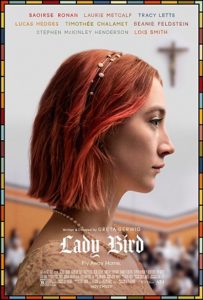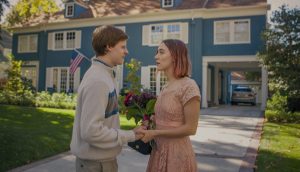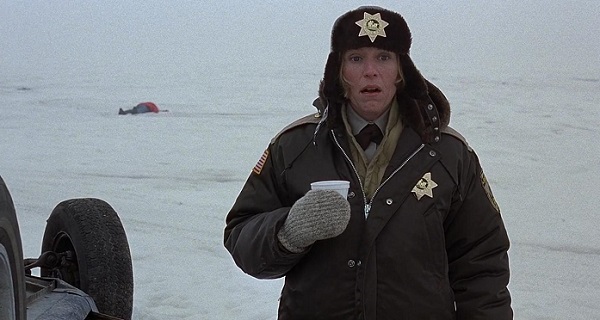 We’ve seen Greta Gerwig as a creative force as an actor in films like 20th Century Women and Frances Ha. She’s collaborated with notable Indie filmmakers like Noah Baumbach and Joe Swanberg on a number of projects, but has yet to steer the ship by herself. Lady Bird is her solo semi-autobiographical directorial debut, which follows a high school senior who is anxious to assert her independence and find a new identity. In fact our young heroine, Christine (Saoirse Ronan), is so dead set on coming into her own, she’s given herself a new name: Lady Bird. A young woman on the brink of freedom and transformation is a story we’ve heard before, but Gerwig deals with the topic in an honest and personal way that makes the story feel fresh all the same.
We’ve seen Greta Gerwig as a creative force as an actor in films like 20th Century Women and Frances Ha. She’s collaborated with notable Indie filmmakers like Noah Baumbach and Joe Swanberg on a number of projects, but has yet to steer the ship by herself. Lady Bird is her solo semi-autobiographical directorial debut, which follows a high school senior who is anxious to assert her independence and find a new identity. In fact our young heroine, Christine (Saoirse Ronan), is so dead set on coming into her own, she’s given herself a new name: Lady Bird. A young woman on the brink of freedom and transformation is a story we’ve heard before, but Gerwig deals with the topic in an honest and personal way that makes the story feel fresh all the same.
I saw the film at the premier of the Austin Film Festival where the mood was lively and the audience was all gathered for a shared purpose: to celebrate the achievements of writers and filmmakers. There’s no doubt this film was a stunning achievement for Gerwig. There are laugh out loud moments like when Lady Bird and her best friend Julie (the brilliantly cast Beanie Feldstein) munch on communion wafers in the girls locker room as they giggle and talk about boys, but the levity is expertly balanced with tender moments, especially between Lady Bird and her mother.
 In the Q&A portion after the showing, Gerwig told an audience member that the most important thing she wanted people to take away from her film was that at the core, the film was a love story between a mother and daughter. Lady Bird’s relationship with her mother does indeed play a central role in the film whether they are fighting about what college she should attend or discussing when the right time to have sex is. Lady Bird’s mother, Marion (played by Laurie Metcalf), is constantly worrying about finances, fretting about her depressed husband, and discouraging Lady Bird not to set her sights too high in life lest she be disappointed.
In the Q&A portion after the showing, Gerwig told an audience member that the most important thing she wanted people to take away from her film was that at the core, the film was a love story between a mother and daughter. Lady Bird’s relationship with her mother does indeed play a central role in the film whether they are fighting about what college she should attend or discussing when the right time to have sex is. Lady Bird’s mother, Marion (played by Laurie Metcalf), is constantly worrying about finances, fretting about her depressed husband, and discouraging Lady Bird not to set her sights too high in life lest she be disappointed.
Marion is overbearing and harsh. It’s not uncommon to see a tumultuous relationship between a mother and daughter portrayed on the screen, but it is a unique experience to see the pains and joys and eventual reconciliation portrayed in such a nuanced way. Their relationship reminded me of Ephesians 6 which talks about children honoring their parents and parents not provoking their children to anger. This dynamic is all over the film as Lady Bird fights back and struggles against what she sees as an upbringing that is holding her back from doing great things. Marion on the other hand is passive aggressive and even downright mean at times, only stirring up more anger and frustration for her daughter.
It’s a cycle that is frustrating to watch, but one that feels relatable. Also relatable is the standard coming-of-age story fare that the film delves into like first loves, applying to college, and senior prom, but Gerwig still manages to flip many expected tropes on their heads. “I thought ‘what if Ladybird has two love interests, and neither of them are right for her?’’ She stated when answering audience questions. This type of counter-genre creative decision lends to the honest approach to telling this story.
 The film shines a light on the sweetness and growing pains of becoming an adult and the people who stand by your side along the way. This is best exemplified in Lady Bird’s dad (an exceptional performance from Terry Letts) and her best friend, Julie. “Your love of home comes into focus when you leave,” said Gerwig during the audience Q&A. As Lady Bird works to spread her wings, we get to see her gain perspective and realize that the people around her are not holding her back, but an integral part of her story. Even the cycle that Lady Bird and her mother find themselves stuck in starts to give way at the end of the film. Getting a small glimpse of the mutual understanding and respect that has been so lacking in their relationship is a heartwarming experience that makes this film one of the most essential family dramas of the year. Lady Bird is playing in select theaters today.
The film shines a light on the sweetness and growing pains of becoming an adult and the people who stand by your side along the way. This is best exemplified in Lady Bird’s dad (an exceptional performance from Terry Letts) and her best friend, Julie. “Your love of home comes into focus when you leave,” said Gerwig during the audience Q&A. As Lady Bird works to spread her wings, we get to see her gain perspective and realize that the people around her are not holding her back, but an integral part of her story. Even the cycle that Lady Bird and her mother find themselves stuck in starts to give way at the end of the film. Getting a small glimpse of the mutual understanding and respect that has been so lacking in their relationship is a heartwarming experience that makes this film one of the most essential family dramas of the year. Lady Bird is playing in select theaters today.



1 comment